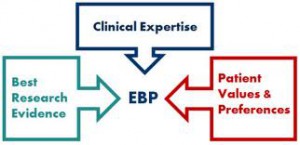February 2, 2013
Chicago, Illinois USA
I am honored to announce that Feedback-Informed Treatment (FIT) has been added to SAMSHA’s official database of evidence-based practices (EBP) known as NREPP (the National Registry of Evidence-based Programs and Practices). Briefly, NREPP is a searchable online registry of behavioral health interventions that have been reviewed and rated by independent reviewers. The purpose of the registry is to assist the public, payers, and practitioners in identifying approaches that have both empirical support and materials available to facilitate implementation.
The Institute of Medicine and American Psychological Association define EBP as, “the integration of the best available research with clinical expertise in the context of patient characteristics, culture, and preferences (see American Psychologist, May 2006). The principles and practices of feedback-informed treatment (FIT) are not only consistent with but provide practitioners with a simple and practical method for operationalizing EBP in their daily work. To wit, routinely and formally soliciting feedback from consumers regarding the therapeutic alliance and outcome of care and using the resulting information to inform and tailor service delivery. As reviewed many times on this blog, multiple, carefully-controlled, randomized clinical trials document that FIT improves outcomes while simultaneously decreasing the risk of drop out and deterioration in care.
Scientific evidence is one matter; being able to support practitioners, agencies, and systems of care in implementing an EBP is another. On this subject, I am proud to say that FIT received perfect ratings (see, “Readiness for Dissemination” tab). Unlike other similar approaches, “no weaknesses” were identified by reviewers. Instead, the summary noted, “ICCE…has an array of comprehensive, well-organized, and high-quality materials to support…implementation…The steps for successful implementation are clear and accompanied by tools and guidance to support the entire process, from the determination of organizations readiness through evaluation.”
Such high marks would not been possible without the contribution of ICCE Senior Associates who worked tirelessly to create the materials and complete the application. A big thanks to Jason Seidel, Psy.D., Bob Bertolino, Ph.D., Susanne Bargmann, Cynthia Maeschalck, Rox Axsen, Bill Robinson, Robbie Babbins-Wagner, Ph.D., and Julie Tilsen, Ph.D..
The formal recognition of FIT as an EBP is a watershed moment in the history of the International Center for Clinical Excellence, further enabling the organization to achieve it’s mission of improving the quality and outcome of behavioral health services.


Leave a Reply